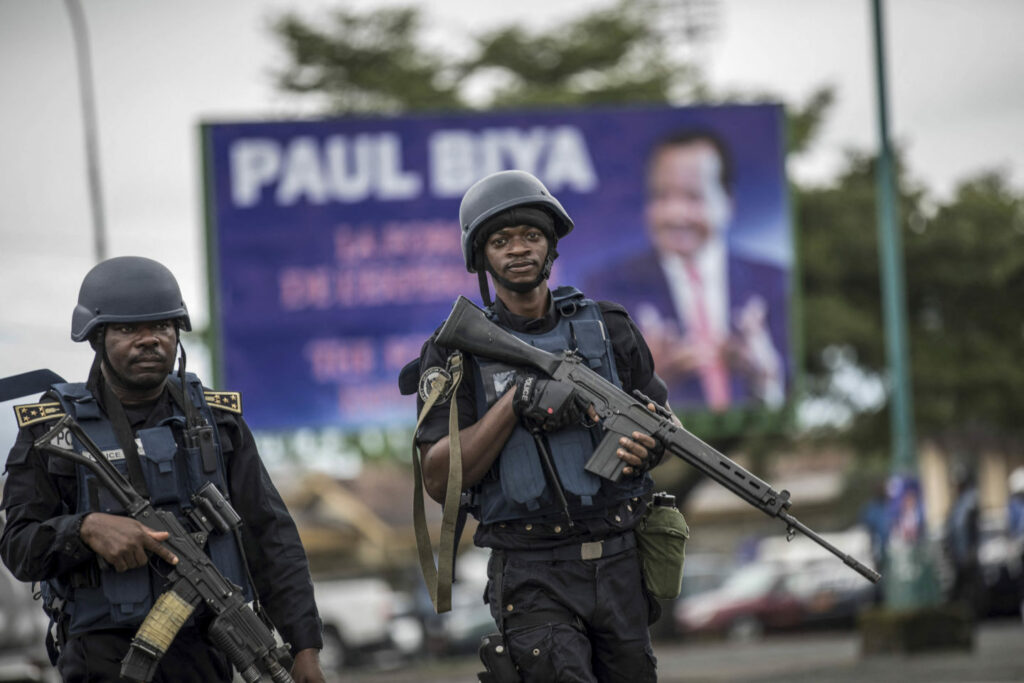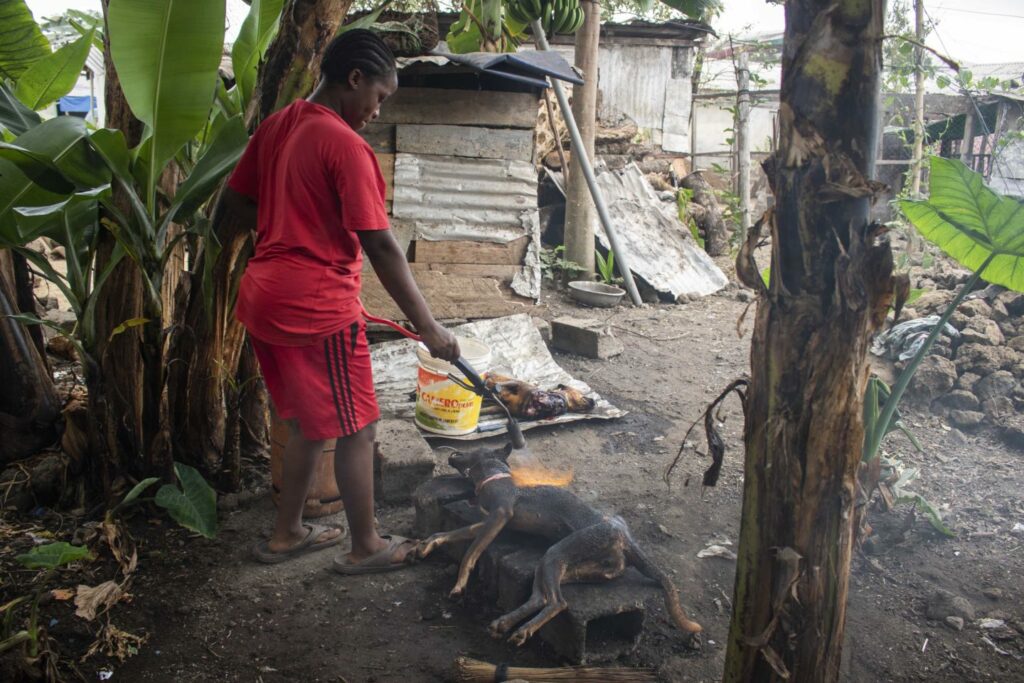An assistant cook checks if the dog meat is ready and spicy enough as customers wait to be served. (Photograph by Amindeh Blaise Atabong)
It is a pleasantly cold and invigorating Monday morning in the mountain town of Buea, about 70km from Cameroon’s economic capital of Douala. At dawn, the streets are conspicuously empty.
At about 9.30am, some young boys as well as middle-aged men and women start making their way into the courtyard of a dilapidated wooden building in Paramount Street, one person at a time. Their objective? Eat hot dog meat and drink alcohol.
But on this day, they have arrived before the two large aluminum pots of dog meat steaming in the centre of the courtyard are ready. The aroma of the freshly slaughtered and spicy dog meat is enthralling. As the eaters wait impatiently, some swallow several times as they salivate, while others gulp down their favourite tipple. Minute by minute, the crowd grows bigger and noisier, until the meat is ready.
On a normal Monday prior to the onset of the Anglophone crisis, these people would be busy in their various workplaces. But since late 2016, Mondays have been forcefully declared and observed as an off-day following orders by Anglophone activists seeking to create an independent state they refer to as Ambazonia.
Mondays, and some other special days, have seen English-speaking North West and South West regions come to a halt with the aim of turning those places into “ghost towns” in protest against decades of real and perceived socioeconomic and cultural deprivation by the Francophone-dominated government.
 1 March 2021: A sign on Paramount Street notifies passersby that the dog meat is ready on a ‘ghost town’ Monday in Buea, Cameroon. (Photograph by Amindeh Blaise Atabong)
1 March 2021: A sign on Paramount Street notifies passersby that the dog meat is ready on a ‘ghost town’ Monday in Buea, Cameroon. (Photograph by Amindeh Blaise Atabong)
The government of 88-year-old President Paul Biya, who has been at the helm of the country for close to four decades, responded with force. It deployed the American and Israeli-trained Rapid Intervention Battalion (BIR), an elite unit of the army that has been indicted for gross human rights violations. The BIR’s response was brutal, radicalising many youths and pushing even moderates to extremes.
Since then, tens of militia groups have sprouted up in a bloody conflict that has its roots in colonial power dealings between Britain and France, and at one point Germany. An unrelenting army has been engaged in unending deadly gunfire exchanges with resolute armed separatist fighters, with civilians caught in the crossfire.
The separatists remain poised to “restore the statehood of Southern Cameroons [Ambazonia]” and have employed several schemes including the “ghost town” approach, which has seriously damaged the economic fabric of the two regions. The Cameroon Employers’ Union reported that around R7-million had been lost by July 2018 owing to the drawn-out conflict.
Buildings and cars that have gone against this order have become the targets of arson attacks and violent reprisals from separatists. In one instance, the victims were workers at state-owned agro-industrial company Cameroon Development Corporation. Armed militiamen confronted the plantation workers while they were on duty and placed their hands on tree trunks before chopping off their fingers. In order not to be subjected to such gratuitous violence, many people like the Monday dog-meat eaters have been obliged to put their safety over work.
‘Nutritional and medicinal’
“Dog meat is ready” handwritten on a rickety board lets patrons know the meat is cooked. With plates in hand, people queue to be served before the two pots are empty. But local chef Jude is not moved by the crowd surrounding him and his two assistants.
The priority is given to 404 club members who pre-ordered through a WhatsApp group he created to bring together lovers of dog meat. 404 is the code name for dog meat, said to have been conceived as a commendation of a dog’s ability to run as fast as the historic French-made Peugeot 404 car.
“Every Monday, when I begin preparations, I post in the WhatsApp group which has over 80 members. People will then place orders for special parts like the head, tail, heart, kidneys and liver. Once dog meat is ready, I begin serving those people before moving to others,” he said.
 Members of the Cameroon National Gendarmerie patrol Omar Bongo Square in majority Anglophone Buea during a political rally for the ruling Cameroon People’s Democratic Movement party. (Photograph by Marco Longari/AFP)
Members of the Cameroon National Gendarmerie patrol Omar Bongo Square in majority Anglophone Buea during a political rally for the ruling Cameroon People’s Democratic Movement party. (Photograph by Marco Longari/AFP)
For a slice of meat, the minimum price is just over R26 and it is accompanied by a few fingers of plantain. Jude sells on average two to three dogs worth of meat within two hours every Monday.
The informal dog meat eatery is patronised every “ghost town” day by people from all walks of life. Remi A, a Buea denizen who works at a commercial bank, has just secured his plate.
“Our bank doesn’t open its doors on Monday. So, to get rid of boredom after the weekend, I never miss an opportunity to come here or to go wherever I can lay my hands on dog meat,” said Remi. “I am first of all a lover of dog meat because it is nutritional as well as medicinal. And the guy here is a professional when it comes to preparing dog meat.”
No end in sight
With the long, drawn-out conflict lingering on and “ghost town” far from ending, 404 operations on Mondays in strategic spots across the North West and South West region have become a favourite pastime.
Joshua Ebot*, an ex-separatist fighter who has yet to give himself up to a regional centre of the government-created national disarmament, demobilisation and reintegration committee, has got on the bandwagon. Ebot passionately enforced “ghost town” as an active combatant before deserting his militia group in nearby Muyuka by the close of 2018.
Now, the ex-combatant who is in his early twenties understands the pain people have been going through on “ghost town” days and is making a contribution to fight boredom through the sale of dog meat.
“When I left Amba because our commanders repeatedly failed to keep to their promises, I decided to go into 404 business because I have also loved cooking,” the ex-fighter said. He is content with the activity because he is able to make ends meet. But Ebot has yet to break completely from his criminal inclinations as some of the dogs he cooks are people’s pets, which he steals from the neighbourhood.
 A young woman uses a hand-held gas burner to remove the fur from the body of a freshly killed dog before the chef cooks it. (Photograph by Amindeh Blaise Atabong)
A young woman uses a hand-held gas burner to remove the fur from the body of a freshly killed dog before the chef cooks it. (Photograph by Amindeh Blaise Atabong)
There are indications the “ghost town” and the dog meat trade may last longer as there is no end in sight for the bloody conflict. It has turned the lives of more than three million people upside down. The United Nations High Commissioner for Refugees in Nigeria had registered 66 899 refugees who had fled the violence in Cameroon by May 2021. Meanwhile, 712 800 have been uprooted from their homes and are now living as internally displaced people, according to the United Nations Office for the Coordination of Humanitarian Affairs.
Local rights groups estimate that since the conflict erupted, more than 5 000 soldiers, separatist fighters and civilians have been killed. As the violence persists, people in the restive regions have experienced illegal arrests and detention, extortion, rape, arson attacks, abduction and torture. Separatist fighters and government forces have taken turns to commit these atrocities.
People such as Remi have been living one day at the time in the troubled regions. But as the belligerents are giving them a hard time, they also find time on Monday “ghost town” for some semblance of normality in the dog meat delicacy.
This article was first published by New Frame.